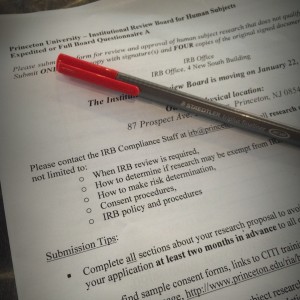Over the course of the semester, PCURs will explain how they found their place in research. We present these to you as a series called The Project That Made Me a Researcher. As any undergraduate knows, the transition from ‘doing a research project’ to thinking of yourself as a researcher is an exciting and highly individualized phenomenon. Here, Jalisha shares her story.
~~~~~~

White lab coats. As a freshman in high school, I believed these to be the quintessential markings of a true researcher. My transition into the world of research, then, occurred during the summer after my first year of high school, when I wore my very own lab coat for the first time.
That summer, I participated in the Research and Engineering Apprenticeship Program, a program charged with the mission of encouraging young minorities to pursue careers in STEM fields. I was assigned to work with a microbiology professor in her lab, where I would assist with research on the presence of harmful bacteria in store-bought lunchmeat. I had nothing more than my high school biology experience for credentials, but with my white lab coat on, I felt prepared for anything. Continue reading The Project That Made Me a Researcher: (No?) Lab Coat Required






